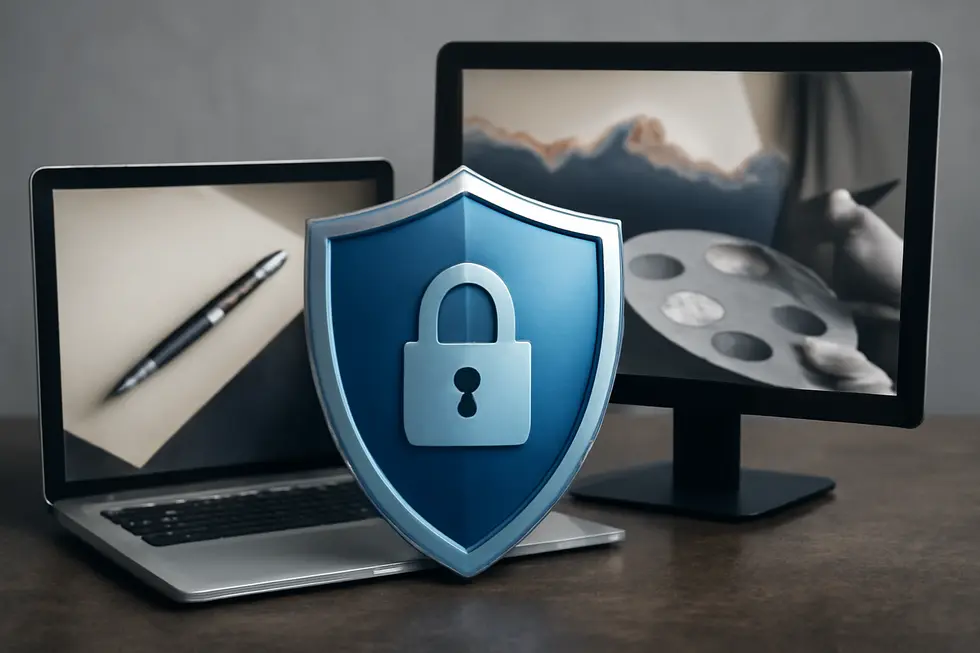Introduction
For business owners, original works—be it branding materials, product designs, software, or advertising content—represent critical assets. While copyright protection automatically applies at the moment of creation, formally registering your copyrights amplifies your control and safeguards over these valuable creations. Understanding the layered benefits of registration equips businesses to protect their intellectual property effectively and leverage it for legal and financial gains. The following chapters explore how registering copyright delivers essential legal advantages and enforcement power, enhances financial and economic opportunities, and establishes formidable protection and deterrence against unauthorized use—ensuring your business’s creative assets remain a foundation of strength and growth.
Tables of Contents
Chapter 1: Legal Advantages and Enforcement Benefits of Registering Copyright
- Unlocking Federal Lawsuits and Statutory Damages: How Copyright Registration Empowers Legal Enforcement
- How Copyright Registration Provides Prima Facie Evidence and Shifts the Burden of Proof in Court
- Empowering Creators: How Copyright Registration Strengthens Enforcement and Unlocks Monetization Opportunities
Chapter 2: Maximizing Revenue and Market Reach Through Copyright Registration
- Unlocking Financial Potential: How Copyright Registration Fuels Income and Expands Market Opportunities
- How Legal Protection Through Copyright Registration Drives Economic Value and Risk Management
- How Copyright Registration Drives Innovation, Job Creation, and Market Growth
Chapter 3: Protection and Deterrence Benefits of Registering Copyright
- How Copyright Registration Creates Strong Legal Evidence and Amplifies Enforcement Power
- Financial Penalties and Legal Tools: Powerful Deterrents Secured Through Copyright Registration
- How Public Record Transparency and Enforcement Power Strengthen Copyright Protection
Chapter 1: Legal Advantages and Enforcement Benefits of Registering Copyright

1. Unlocking Federal Lawsuits and Statutory Damages: How Copyright Registration Empowers Legal Enforcement
Registering a copyright goes far beyond the initial automatic protection granted by mere creation. While an original work is protected the moment it is fixed in a tangible form, registration creates an indispensable legal foundation that enables stronger, more effective enforcement in U.S. courts. This step fundamentally transforms a creator’s ability to defend and monetize their intellectual property by unlocking exclusive legal remedies unavailable to unregistered works.
One of the cornerstone benefits of registering a copyright is the creation of a public, official record of ownership. This registration serves as incontrovertible evidence that you are the rightful creator, placing your claim on firm legal footing. It eliminates ambiguity about the existence and authorship of the work, which can be pivotal during infringement disputes. This legal recognition makes it easier to assert your rights and is often the difference between a weak claim and a viable, enforceable one.
Perhaps the most significant enforcement advantage is the right to initiate federal litigation for copyright infringement. Federal courts have exclusive jurisdiction over copyright matters, but they require registration before a lawsuit can proceed. Without this prerequisite, creators are barred from pursuing legal action in federal courts, which generally offer stronger protections and remedies than state courts. This restriction highlights registration as a critical gatekeeper to the full spectrum of federal enforcement mechanisms.
Registered copyrights are also eligible to recover statutory damages and attorney’s fees—powerful tools that deter infringement and support creators’ ability to enforce their rights. Statutory damages allow copyright holders to receive predetermined monetary awards without the burden of proving actual financial loss or quantifying damages. This significantly lowers the evidentiary bar and discourages would-be infringers who might otherwise exploit the difficulty of calculating damages to evade liability. Furthermore, the possibility of recovering attorney’s fees shifts the financial balance, making it less costly and more feasible for creators to defend their works.
The availability of these remedies makes copyright registration a formidable deterrent to piracy, unauthorized reproduction, and distribution. Legal actions backed by registration can lead to injunctions that halt ongoing or future infringements, effectively protecting the creator’s economic and moral interests. By contrast, unregistered works face limited enforcement options and often must settle for less effective remedies, leaving creative efforts more vulnerable.
In sum, registration dramatically enhances the legal arsenal available to creators, confirming ownership, enabling federal lawsuits, and unlocking statutory remedies that significantly increase the likelihood of successful enforcement. This legal empowerment encourages creators to invest in and safeguard their original works, fueling innovation and preserving the value of creative property.
For more detailed information about these legal enforcement benefits, refer to resources provided by the U.S. Copyright Office here.
2. How Copyright Registration Provides Prima Facie Evidence and Shifts the Burden of Proof in Court
When a creative work is registered with the U.S. Copyright Office, the registrant gains a critical legal advantage: the registration certificate serves as prima facie evidence of ownership and the copyright’s validity. In practical terms, this means courts generally accept the registration as sufficient proof that the claimant owns the copyright in question, without needing additional evidence at the outset. This strength of proof shifts the legal dynamics in infringement cases, making enforcement significantly more straightforward and effective.
Without registration, while a copyright exists from the moment a work is fixed in a tangible medium, the work’s owner must establish validity and ownership during litigation. This can be complex and burdensome, potentially requiring extensive documentation and expert testimony. In contrast, registration places the initial burden on the alleged infringer to counter the presumption of ownership. The defendant must prove that they did not infringe or present valid defenses to avoid liability. This burden of proof shift can discourage meritless infringement claims and accelerate resolution.
Moreover, registration is a prerequisite for initiating a copyright infringement lawsuit in federal court. This procedural gatekeeping ensures that only works with a documented public record of ownership proceed to litigation. Once a lawsuit is underway, the evidentiary advantage of registration facilitates quicker and clearer adjudication of ownership, strengthening the plaintiff’s position.
Registered copyright holders can also pursue statutory damages and attorney’s fees, remedies unavailable to those without registration. Statutory damages allow courts to award fixed sums for infringement without the copyright owner proving actual financial harm. This can serve as a powerful deterrent against unauthorized use by imposing significant financial consequences on infringers. The recovery of attorney’s fees further incentivizes copyright owners to enforce their rights and pursue lawful protection.
Besides improving legal standing in court, the act of registering a copyright creates an official public record. This transparent, government-acknowledged ownership notice often deters potential infringers who must recognize the explicit legal claim. This deterrence preserves a work’s commercial and artistic value by making infringement a riskier and less attractive proposition.
While automatic copyright protection without registration offers some security, the evidentiary and enforcement enhancements linked to registration make it a cornerstone of legal defense. It transforms abstract rights into actionable claims backed by a recognized presumption of validity and ownership, providing creators with much-needed leverage.
For creators intent on guarding their intellectual property, understanding this significance of prima facie evidence and the burden of proof in copyright litigation is vital. It elevates registered copyrights from mere creative claims to enforceable legal assets with robust protections and remedies.
For more insight on enforcement advantages tied to formal registrations, see LegalZoom’s discussion on the legal weight registration carries in court proceedings.[1]
[1] https://www.legalzoom.com/articles/benefits-of-registering-your-copyright
3. Empowering Creators: How Copyright Registration Strengthens Enforcement and Unlocks Monetization Opportunities
Registering a copyright significantly enhances a creator’s ability to enforce their rights and capitalize on their intellectual property. While copyright protection arises automatically once a work is fixed in a tangible form, registration establishes a definitive legal foothold that transforms passive ownership into actionable control. This subchapter explores how registration empowers rights holders to take legal action, deter infringement, and generate revenue through licensing and sales.
One of the most critical legal advantages registration provides is the exclusive right to initiate federal lawsuits against infringers. Without registration, creators cannot access U.S. federal courts or claim important remedies such as statutory damages and attorney’s fees. These remedies, available only when registration occurs within three months of publication or prior to infringement, dramatically increase the leverage of copyright owners. They enable more effective deterrence by signaling that infringement carries serious financial consequences beyond merely forcing infringers to stop unlawful use.
In addition to litigation benefits, registration publicly records ownership, clarifying who holds exclusive rights to reproduce, distribute, or adapt the work. This transparency bolsters enforcement by reducing ambiguity and making it easier to prove ownership in disputes. It also discourages unauthorized use, as potential infringers recognize the heightened risk presented by a publicly documented claim. These factors combine to provide a solid foundation for creators to protect their works assertively.
The public record of copyright ownership also plays a vital role in monetization. Creators can enter licensing agreements with confidence, knowing they have indisputable rights to authorize usage. This is particularly valuable in emerging fields such as artificial intelligence, where copyrighted content is licensed for uses like machine learning training data. Clear ownership enabled by registration ensures that creators can negotiate fair compensation and impose standards that maintain the work’s quality and integrity.
Moreover, registration fosters innovation by safeguarding creators’ exclusive control over reproduction, adaptation, and public performance. This exclusivity fuels competition and incentivizes investment in new works, as creators are assured they can recoup their efforts without fear of unauthorized exploitation. Registered copyrights also provide grounds for injunctions that halt ongoing infringement, preserving the market value of the intellectual property.
For example, a software developer with a registered copyright gains the ability to sue infringers in federal court efficiently while simultaneously licensing the software under terms that protect its functionality and user experience. This dual power of enforcement and monetization maximizes both legal protection and financial return, making registration a vital tool in a creator’s arsenal.
In summary, copyright registration is not merely a formal step but a pivotal enabler of enforcement and commercial success. It grants legal standing, access to enhanced remedies, clear ownership documentation, and the capability to leverage creative works for licensing and sales. These advantages together provide creators with stronger control, broader protection against infringement, and expanded opportunities to benefit financially from their original works.
For a deeper understanding of how to safeguard copyrighted works strategically, see this detailed guide.
Chapter 2: Maximizing Revenue and Market Reach Through Copyright Registration

1. Unlocking Financial Potential: How Copyright Registration Fuels Income and Expands Market Opportunities
Registering a copyright transforms a creator’s work from a mere creative expression into a powerful financial asset. This legal step goes beyond simply safeguarding the original work; it establishes exclusive rights that open numerous avenues for income generation and market expansion. By securing copyright registration, creators obtain clear, documented ownership, enabling them to enforce their rights with confidence and commercialize their works more effectively.
One of the primary financial benefits of copyright registration lies in the ability to monetize through licensing agreements. Licensing allows copyright holders to grant permission to third parties to use their work in exchange for royalties or fees. These agreements can be tailored to different industries and platforms, expanding the work’s reach without relinquishing ownership. Beyond licensing, outright sales of copyright or specific rights further diversify income streams, providing creators with upfront payments or negotiated royalties. These avenues often reflect a sustainable flow of revenue, supporting ongoing creative endeavors.
Copyright registration also plays a crucial role in market expansion. With registration in place, creators can confidently enter new markets or form strategic partnerships. The ability to prove ownership and exclusive rights provides a foundation for business collaborations, whether through multimedia projects, merchandise, or international distribution. These opportunities extend visibility and access to broader audiences, fostering brand building and reputation growth. Particularly in sectors like software, artificial intelligence, and digital content, clear legal ownership is essential for lawful transactions and attracting investment, thereby accelerating economic impact.
Moreover, registered copyrights confer significant legal powers that strengthen financial safeguards. Owners are equipped to pursue federal infringement lawsuits and seek statutory damages, which not only deter unauthorized exploitation but also protect potential income. This legal backing is essential for maintaining the work’s integrity and preventing losses caused by piracy or unauthorized distribution. Knowing that their rights are enforceable encourages creators to invest confidently in marketing and further development.
On a broader scale, copyright registration supports the creative economy by sustaining industries reliant on intellectual property. It incentivizes innovation by ensuring creators can reap economic benefits during the exclusive term, motivating continued artistic and technological advancement. This dynamic fosters job creation and economic growth, particularly in creative and technology-driven sectors.
Ultimately, the financial advantages of copyright registration are foundational for transforming creative output into enduring economic value. It enables creators to protect their rights, unlock diverse revenue streams, and expand into new markets with assurance. This strategic protection and commercial leverage make copyright registration an indispensable tool for anyone seeking to maximize the economic potential of their original works.
For deeper insights into how intellectual property rights intersect with business growth strategies, visiting this resource on trademark necessity for businesses can provide complementary perspectives on securing and capitalizing on creative assets.
2. How Legal Protection Through Copyright Registration Drives Economic Value and Risk Management
Registering a copyright serves as a powerful foundation for safeguarding creative works, but its true economic value emerges from the legal protections it provides and the risk reduction it enables. While copyright protection arises automatically upon the creation of a work fixed in a tangible form, registration establishes an official public record of ownership. This legal recognition not only affirms authorship but unlocks critical enforcement tools that can deter infringement and preserve the financial viability of creative assets.
One of the foremost economic benefits of copyright registration lies in its role as undeniable proof of ownership. This legal proof is essential when disputing unauthorized use or pursuing infringement claims. Without registration, a copyright owner cannot initiate a federal lawsuit, significantly limiting their ability to enforce rights and recover damages. Registered copyrights, however, empower creators to sue for statutory damages and attorney’s fees—remedies that strengthen negotiation leverage and help offset litigation costs. These tools reduce uncertainty and legal exposure for creators and businesses, effectively lowering financial risk and protecting investments in intellectual property.
Beyond legal enforcement, registration facilitates monetization opportunities that can drive lasting income streams. Holding exclusive rights to reproduce, distribute, and adapt a work opens doors for licensing agreements, assignments, and commercial exploitation. This exclusivity acts as a financial incentive, encouraging continued innovation and investment within creative industries. By controlling how a work is used and by whom, copyright holders can maintain quality standards, protect brand reputation, and command higher market value. Such control also supports strategic business decisions, including partnerships and distribution models, further enhancing profitability.
The deterrent effect of copyright registration plays a critical role in risk mitigation. Registered works send a clear signal that infringement will be met with formal legal action, discouraging piracy and unauthorized exploitation that can cause substantial economic damage. In creative sectors where intellectual property is a primary asset, reducing infringement protects jobs and preserves market integrity. Moreover, registration creates a safer environment for creators to invest time and resources, knowing their rights have enforceable backing.
Strategically, registered copyrights can boost a company’s overall business profile and financial health. Intellectual property assets contribute to brand recognition and customer loyalty, forming integral components of competitive advantage. Furthermore, they may enhance opportunities for favorable tax treatment or collateral in financing arrangements, reinforcing long-term economic sustainability.
In sum, registering a copyright is not merely a formal step but a critical economic strategy that maximizes the value of creative works. The legal protections it affords reduce risks, empower enforcement, and unlock revenue potential, making it indispensable for creators and businesses seeking to fully capitalize on their intellectual property.
For additional insights on protecting your business’s intellectual assets, consider exploring resources on trademark registration as well, such as this informative guide on whether you need a trademark for your business.
3. How Copyright Registration Drives Innovation, Job Creation, and Market Growth
Registering a copyright goes far beyond safeguarding individual creative works—it also stimulates broader financial and economic progress by underpinning innovation, job growth, and industry sustainability. When creators secure registration, they obtain exclusive rights to their works, which empowers them to monetize these assets through licensing, sales, or strategic partnerships. This exclusivity creates tangible financial incentives that encourage continual investment in developing new and original content, software, or artistic works.
A critical contributor to economic vitality is the thriving ecosystem of copyright-intensive industries. These sectors, ranging from publishing and music to software and multimedia, rely heavily on intellectual property protections to sustain their workforce and sales revenues. Copyright registration fortifies this foundation by ensuring creators and companies can combat infringement effectively, mitigating losses caused by piracy and unauthorized exploitation. By preserving the value of original works, registration helps maintain employment levels and industrial output, which ripple positively through local and global economies.
The innovation incentives driven by registration are significant. Guaranteed exclusive rights during the protection term motivate creators to allocate resources toward research and development, fueling continuous creative breakthroughs. This process nurtures a competitive environment where new technologies, products, and cultural expressions evolve. For industries such as software development, this incentive accelerates technological advancement, driving broader economic benefits in the form of enhanced productivity and novel market opportunities.
Moreover, copyright registration provides a clear, legally recognized proof of ownership. This clarity is essential when enforcing rights against infringement, enabling swift legal remedies that uphold the legitimate market for creative goods. Effective enforcement not only deters piracy but also stabilizes income streams for creators and businesses, encouraging sustained economic participation. Protecting intellectual property rights thus helps reduce uncertainty, fostering an environment conducive to investment and growth.
The positive impact of copyright registration extends into the global economic landscape. Strong intellectual property regimes enable countries and industries to maintain competitive advantages internationally. Protection encourages export markets for creative goods, boosting trade balances and cultural exchange. Copyright registration thereby acts as a catalyst for sustained economic expansion, supporting diverse sectors and communities connected to creative production.
In essence, registering copyright is a vital economic lever that supports creators while reinforcing the wider economic framework. It advances innovation by incentivizing new creations, sustains employment by protecting industry value, and amplifies market competitiveness domestically and abroad. The combined effect significantly contributes to durable and dynamic economic growth.
For a deeper understanding of how intellectual property rights influence economic development, consider exploring resources from organizations such as the World Intellectual Property Organization (WIPO), which provide detailed analyses and statistics on these impacts.
Chapter 3: Protection and Deterrence Benefits of Registering Copyright

1. How Copyright Registration Creates Strong Legal Evidence and Amplifies Enforcement Power
Copyright registration plays a pivotal role in translating the inherent protection of original works into strong, actionable legal evidence. While copyright protection arises the moment a work is fixed in a tangible form, registration establishes a concrete legal record that serves as prima facie evidence of ownership. This advantage reduces the burden on the copyright holder during infringement disputes by shifting the responsibility to the alleged infringer to disprove ownership or originality. This evidentiary benefit is foundational for securing early and decisive court rulings in favor of the creator.
Beyond this evidentiary strength, registration is the gateway to powerful enforcement options unavailable to unregistered works. Without registration, a copyright holder cannot initiate federal infringement litigation. Registration therefore acts as a legal key that unlocks judicial remedies, including the ability to seek statutory damages ranging from $750 to $30,000, with the possibility of up to $150,000 for willful infringement. Crucially, these damages can be awarded without the copyright owner having to prove actual monetary loss, making the enforcement process far more efficient and financially viable. Additionally, successful claimants can recover attorney’s fees, allowing creators to pursue their rights without disproportionate financial risk.
The creation of a public record through registration also plays a substantial deterrent role. Publicly accessible registration certificates notify potential infringers of the work’s protected status, thereby reducing innocent or accidental infringement. This transparency strengthens a creator’s position before disputes escalate, enabling more effective DMCA takedown requests and settlement negotiations. Registered works command heightened respect in both informal and formal enforcement interactions because their unassailable legal status enhances credibility.
Moreover, swift enforcement hinges on timely registration. Early registration — ideally before infringement occurs — empowers creators to act immediately against unauthorized use. The ability to engage legal processes promptly curtails ongoing damage to the value and integrity of the work, preventing further unauthorized reproduction, distribution, or adaptation. This preemptive legal readiness amplifies a creator’s deterrence capabilities by signaling to would-be infringers that infringement will meet prompt legal opposition.
In addition to legal proceedings, registered copyrights often accompany formal copyright statements that serve as clear legal and societal signals. These notices inform the public of lawful use boundaries, fostering a culture that respects creators’ rights economically and reputationally. Such signals complement enforcement efforts by minimizing inadvertent violations and encouraging compliance.
Together, these benefits demonstrate how registering a copyright not only bolsters legal evidence but also significantly enhances the creator’s ability to enforce and deter infringement effectively. By creating an undeniable ownership record and unlocking robust legal remedies, registration secures both the economic and moral interests of creative professionals. For a detailed exploration of why copyright registration matters for authors, see this insightful article on copyright registration.
2. Financial Penalties and Legal Tools: Powerful Deterrents Secured Through Copyright Registration
Registering a copyright establishes a powerful foundation for protecting a creator’s rights by unlocking crucial financial penalties and legal enforcement tools designed to deter infringement. Unlike the automatic protection granted upon creation, registration creates an official public record of ownership that serves as prima facie evidence of validity and originality in court. This evidentiary advantage reduces the burden on the copyright holder to prove ownership, setting the stage for stronger legal recourse when infringement occurs.
One of the most compelling deterrents offered by registration is access to statutory damages. Licensed by federal law, these damages provide copyright holders with financial compensation ranging from $750 to $30,000 per infringed work without the need to demonstrate actual monetary losses. When infringement is willful—meaning it is intentional or egregious—the damages can escalate up to $150,000, offering a substantial financial threat to potential infringers. This provision alone discourages unauthorized copying or distribution by raising the stakes significantly. Moreover, registration qualifies the copyright holder to recover attorneys’ fees and litigation costs, which can be prohibitively expensive for infringers facing a registered claim. These financial consequences work in tandem to make infringement a high-risk endeavor.
Beyond monetary penalties, registration empowers creators with a suite of effective legal remedies to stop and deter unauthorized exploitation. The ability to promptly issue takedown notices under laws like the Digital Millennium Copyright Act (DMCA) helps halt ongoing online infringement quickly. Should informal measures fail, the creator can file a federal lawsuit, where courts often grant injunctions to immediately stop further unauthorized use or reproduction. This swift intervention protects the market value and integrity of the work while legal proceedings unfold. Additionally, criminal sanctions including fines and imprisonment may apply for willful infringement conducted for commercial advantage or private financial gain. These criminal penalties underscore the seriousness of copyright violations and add a further layer of deterrence that extends beyond civil claims.
Another subtle but important benefit of registration is the creation of a searchable public record. This transparency allows licensing agents, buyers, and potential collaborators to verify ownership and assures them of the work’s legal protection. The increased visibility not only supports revenue-generating opportunities such as licensing agreements and outright sales but also signals to would-be infringers that the work is monitored and protected by law. Through this mechanism, registration indirectly deters infringement by boosting the perceived risks and consequences.
Together, these financial penalties and legal remedies form a comprehensive shield that both protects creators and deters unauthorized use. They enhance the enforcement capability beyond mere ownership claims, providing tangible and immediate consequences for infringement. This multifaceted protection makes copyright registration a decisive step for creators seeking to safeguard their creative investments and maximize economic returns.
For a deeper understanding of how these protections compare with other intellectual property rights, exploring differences with trademarks may also provide useful insights.
3. How Public Record Transparency and Enforcement Power Strengthen Copyright Protection
Registering a copyright extends far beyond merely acknowledging the existence of a work; it establishes an essential public record that solidifies ownership and empowers proactive enforcement measures. This official registration provides a transparent, accessible declaration to the world about who holds the legal rights to a creative work. By creating a public record with a government office, such as the U.S. Copyright Office, creators ensure their ownership claims are documented and easy to verify. This transparency acts as a preventive mechanism—potential infringers are less likely to misuse or appropriate a work when clear ownership information is publicly available.
The presence of an official registration creates a powerful deterrent against infringement. It sends a strong message that the rights are not only claimed but are enforceable under federal law. Unlike unregistered works, which cannot be the basis for many legal claims, registered copyrights enable the owner to seek statutory damages and attorney’s fees. These remedies significantly raise the stakes for anyone considering unauthorized use, increasing the likelihood that infringers will reconsider or cease their actions. This legal advantage enhances both the actual and perceived risks involved in violations, thus strengthening deterrence.
Beyond providing leverage in court, registration supports the practical enforcement of rights through improved monitoring and documentation. A registered work can be more easily tracked for unauthorized use across various platforms and media. When disputes arise, the registration certificate serves as crucial evidence that the work is owned by the plaintiff, simplifying the burden of proof in litigation and speeding up legal resolutions. Creators who keep detailed records alongside their registration—such as dated drafts, distribution logs, or licensing agreements—further reinforce their claims, enabling clearer, more effective enforcement.
The combined effect of these elements means copyright registration is a foundational tool for creators who want to protect their work vigorously and proactively. Rather than relying on vague or difficult-to-prove rights, registration clarifies ownership publicly and arms creators with enforceable legal authority. This comprehensive approach prevents unauthorized reproduction, modification, or distribution by establishing a clear record and strong consequences for infringement.
Creators and businesses looking to understand the registration process and how to maximize enforcement strategies can consult resources such as the official U.S. Copyright Office website. Legal professionals and intellectual property services also offer guidance tailored to specific types of work and infringement scenarios. For those navigating broader intellectual property protection, exploring related topics like trademark registration can be valuable. For instance, understanding when to consider trademarks for your business complements copyright protection efforts by covering different aspects of creative and commercial identity.
In summary, public record transparency combined with robust enforcement rights creates a strong framework that protects creators’ interests by deterring infringement and enabling swift legal responses. This dual benefit underscores why registration is a critical step in safeguarding the economic and moral value of original works.
Final thoughts
Registering copyright is a vital strategic decision for business owners who depend on original works to drive growth and brand value. This formal registration not only confers decisive legal advantages—such as the ability to sue federally and seek statutory damages—but also opens doors to significant financial benefits by enabling licensing and enhancing asset valuation. Furthermore, the protective and deterrent powers of registration shield your business from costly infringements, preserving your creative integrity and competitive position. Ultimately, taking the step to register copyrights transforms creative assets from intangible ideas into enforceable, monetizable, and well-defended business foundations that contribute directly to sustained success and innovation.
Your IP is the foundation of your success – let’s protect it together before it’s too late. We can’t wait to help you turn your ideas into legally secured assets.
About us
At trademark2go.com, we’re your go-to partners for simplifying trademark, patent, and copyright registration. Our team of IP experts cuts through legal complexity, avoids common pitfalls, and delivers personalized guidance—whether you’re a startup, inventor, or creator. We prioritize your goals, turning your ideas into legally secured assets with clarity and care. Let’s protect what drives your success, together.


